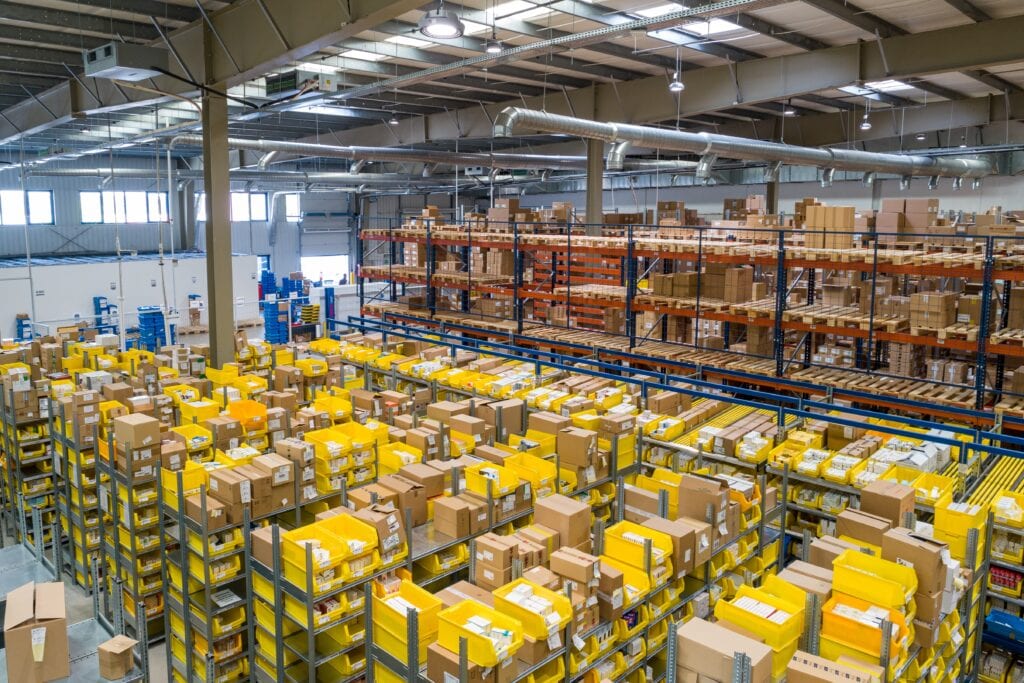A warehouse can be considered as a space dedicated to storing goods and materials efficiently. Warehouses are used by nearly all kinds of persons and entities engaged in business, like manufacturers, wholesalers, exporters, importers, etc. Numerous types of businesses require warehouses, including transport and customs, among others.
So, in the most straightforward words, a warehouse is a building for storing goods. But in practice, it is much more than that.
While this task seems relatively insignificant compared to other business process segments, it’s imperative to realise that it is a dynamic operation and can generate a profitable return on investment when employed efficiently.
The role of a warehouse is crucial, to say the least. To understand this statement better, let’s look at the following functions of a warehouse –
1. Storage
The primary function of a warehouse is to provide storage space for equipment, inventory or other items. It offers appropriate facilities to the enterprises for storing their goods when they aren’t called for a sale. This helps prevent wastage of stock and ensure its protection and safety. Such goods may be held from the time of their production or purchase till their use or consumption.
The storage may be of two types-
(i) Planned Storage: It refers to the carefully estimated storage required to meet the regular customer demand.
(ii) Extended Storage: It refers to the storage requirement above the planned storage. Various factors can cause it, a few of them being –
- Demand Seasonality: For example, the demand for confectionery items rises drastically during the holiday season, requiring additional storage space for that specific period.
- Promotional Campaigns: Generally, because of promotional campaigns such as sales promotion, extra stock needs to be kept to satisfy the expected higher demand for the product.
- Speculative purchases: Sometimes, goods are purchased in bulk due to lower price or higher price expectations in the future. This calls for more storage space to be arranged.
Hence, the storage function of a warehouse helps in smoothening out the routine operations of the business as well as takes care of many atypical situations.
2. Safeguarding of Goods
A warehouse offers protection to goods from loss, theft, or damage due to unfavourable weather conditions like heat, wind, dust and moisture, etc.
A warehouse can make particular arrangements for different products catering to their nature. For example, it can hire security staff to prevent theft, arrange cold storage facility for perishable goods, use insecticides for preservation, install fire-fighting apparatus to avoid any fire accidents.
If all of these cases are considered prudently and addressed carefully, a warehouse can significantly cut down losses due to spoilage of goods and wastage during storage.
3. Movement of Goods
It consists of the following-
- Inbound activity– It means unloading of goods received by the warehouse.
- Transfer to storage– It refers to transferring the goods from the inbound area to the storage area.
- Order selecting–It means choosing the item in the storage corresponding to the order to be shipped and moving it to the shipment area.
- Outbound activity– Lastly, we have ‘outbound activity’, which means inspecting and loading the goods for shipment.
The movement of goods inside a warehouse must be as seamless as possible to ensure uninterrupted orders. Hence, the infrastructure of the warehouse, as well as the software systems used by it, should be upgraded regularly.
4. Financing
Financing is another one of the diverse functions of a warehouse. Warehouse financing is a type of inventory financing that involves a loan provided by a financial institution to a manufacturer, company, or processor. In this case, goods, inventory, or commodities are deposited in a warehouse and used as collateral for the loan.
When goods are transferred to any warehouse, the depositor gets a receipt, which acts as evidence about the deposit of goods. The warehouse can also issue a certificate in favour of the owner of the goods, which is called ‘Warehouse-keeper’s warrant’. This is a document of title and can be passed on by simple endorsement and delivery. So while the goods are in the custody of the warehouse-keeper, the owner can procure loans from banks and other financial institutions, pledging this warrant as security.
In certain circumstances, warehouses give money advances, too, to the depositors for a short term retaining their goods as security.
There are many benefits that borrowers can derive from warehouse financing. The significant advantage of warehouse financing is the ability of borrowers to use their raw materials, commodity and other goods as collateral for the loan. Warehouse financing often provides borrowers with the option to obtain financing on more favourable terms than unsecured loans or short-term working capital. Moreover, the terms of warehouse financing are comparatively flexible and generally favourable to the borrower, small businesses, and manufacturers leverage on this type of loan. It is a secured loan and therefore is often cheaper than other types of borrowing.

5. Value-added Services
A value-added service goes beyond conventional warehousing. Such services help optimise the supply chain management, generate higher value, and deliver products efficiently to customers. They include bundling, customisation, re-branding, re-packaging, processing, etc. A few of them are discussed below–
- Processing: It refers to the process that certain goods go through to make them consumable. For example, seasoning of timber, ripening of fruits, processing of coffee beans, polishing of paddy, etc. Sometimes warehouses perform such activities on behalf of the owners.
- Grading and branding: Warehouses also undertake the functions of grading and branding goods on behalf of the wholesaler, importer or manufacturer of goods. They also offer services for mixing, blending and co-packing or repacking service.
- Kitting & Product Customisation: Customisation services provided by warehouses give the flexibility to make bundles or customised product for any customer or market requirements (for example- bundling, SKU building, localising, product boxing or kitting).
- Other services: Other value-added services provided by a warehouse include labelling, stamping, gift packing, barcode printing, order fulfilment and invoice printing, quality checking, insurance, and goods disposal.
Availability of such services with the warehouse takes a considerable burden off the entity using the warehouse and helps it focus on its core activities. This results in lower costs and higher standards.
6. Price Stabilisation
Warehouses play a crucial role in the process of price stabilisation. They help control violent fluctuations in prices by –
- Storing goods, when their supply exceeds demand in the market.
- Releasing goods, when the demand gains pace.
When there is excess demand in the market, the extra inflow of goods may further decrease their price and lead to losses for the business owners. Hence, in this case, the warehouses hold the stock back until the demand for such goods rises again.
This is how warehouses ensure a regular supply of goods in the market by matching supply with demand, hence, stabilising prices.
7. Information Management
Warehouses keep track of information about goods and materials sent into the warehouse, stored and shipped out. In addition to that, any other information regarding the warehouse is recorded. It allows the warehouse managers and other concerned personnel to get accurate insights to ascertain the availability of stock, stock processing and stock replenishment requirements.
The data maintained by the information system in the warehouse must be precise, timely, and free from errors. It may then be presented to the higher management for the purpose of making more informed and better decisions.
8. Other Functions
Apart from the roles mentioned above, warehouses can also perform the following functions –
- Risk bearing- The moment goods are delivered for storage, the liability of these goods transfers to the warehouse-keeper. Consequently, the risk of loss or damage to goods is borne by the warehouse keeper. Since it is now its obligation to return the goods in good condition, the warehouse becomes responsible for any mishappenings. Thus, it takes all precautions to prevent any such situation. The stored goods may also be insured for compensation in case of loss.
- Rental property- Some warehouses can also serve as a source of rental income for their owners who rent them out to people or entities that seek to use them for storage or other purposes.
- Place utility- Warehouses are mainly located at convenient places, for instance, near a road, airport, rail or waterways to ease the movement of goods.
By examining these functions, it is logical to claim that a warehouse plays a much more pivotal role in the success of a business than most people manage to realise. Proper monitoring of these functions is imperative to guarantee that all warehousing operations take place efficiently.
Related posts
- 6 Major Benefits Of Bonded Warehouse
- 8 Key Functions Of Warehouse Management System (WMS)
- 6 Major Types of Cold Storage
- 6 Major Advantages of Cold Storage
- 5 Core Functions Of Third-Party Logistics (3PL) Providers
- 13 Most Important Warehouse Processes
- Advantages of renting a warehouse in Chennai
- Advantages of Renting a Warehouse in Mumbai
- Everything You Need To Know About A Bonded Warehouse
- Top 8 Features Of Warehouse Management System (WMS)
- 10 Practical Tips To Reduce Warehouse Costs
- 11 Best Warehouse Management Systems (WMS)
- LTL Vs FTL : 7 Major Differences Between LTL & FTL
